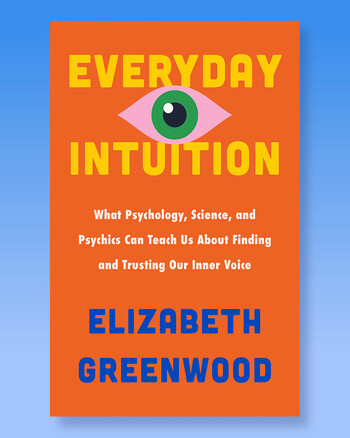In her new book, Everyday Intuition, writer Elizabeth Greenwood ’13SOA delves into everything from psychology and neuroscience to psychics and psychedelics to determine what our inner voices are — and how we should use them.
How did this book come about?
It came from a really personal place. My mother has always been led by her intuitive sense, and she taught me and my sister to do the same. But at the same time, I also come from a family with a strong sense of inevitable doom. In any situation, we tend to assume the worst. Lost a parking-garage ticket? That must mean we’re trapped in the garage forever. I started to wonder, were we driven by intuition or anxiety? Is there a difference between those two things? When I started to do my research, I wanted to cast the widest possible net, and talked to experts from a variety of disciplines, to try to get an answer.
What did you determine? Is there a difference between intuition and anxiety?
There absolutely is a difference. I feel silly that I even got them confused in the first place. I think the biggest difference is in tone or tenor. Anxiety is really urgent; it’s a voice in your head that wants you to act. Anxiety also often has a temporal element, meaning that there’s fear about the past or the future. Intuition is gentler and more subtle. There are often biofeedback markers of intuition — if you’re getting a good vibe from something, you might have a warm feeling in your chest, a relaxing in your body. If the feeling is bad, you might feel a drop in your stomach, or your muscles might tense. Even though I intellectually know the difference now, I have to learn it again every single day, because it’s easy to let anxiety hijack you.
How do you re-learn it? Is that process different for different people?
It is. Understanding the difference between intuition and anxiety has a lot to do with pattern recognition and knowing your own personal patterns. There are four times when I think no one should make any big decisions — when you’re hungry, angry, lonely, or tired. But beyond that, it varies from person to person. I know that evenings are not good for me; I’m busy getting the kids to bed, often overstimulated from a full day of activity. So, the feelings that I get then are likely to stem from anxiety rather than intuition. I also know that, because I come from a family of catastrophizers, I am prone to assuming the worst. So, if I get a feeling that my plane is going to be canceled, for example, I often take a step back. I recognize that pattern in myself and know that’s not intuition, it’s anxiety.
How does expertise factor into intuition? Are there qualifications about when you should use your intuition and when you shouldn’t?
Absolutely. I think that people think of intuition as an arbitrary feeling, that exists in a bubble. But that’s not the case. Intuition is informed by expertise. In my book I write about the professional poker player (who also has a PhD in psychology from Columbia) Maria Konnikova ’13GSAS, who says that “intuition is basically another term for incredible domain expertise.” She’s a relatively new poker player, so when she has a gut feeling that someone is bluffing, she can’t just blindly trust it. She has to analyze why she’s having that feeling — maybe it’s based on something legitimate, maybe she just doesn’t like the other player and wants a reason to call. Whereas her coach has been playing poker since the 1980s. If he has a gut feeling, he should trust it, because it’s based on hundreds of thousands of hours of practice and playing.
Some of the examples of intuition that you give in your book are based on fact. Someone deciding whether to take a job has a gut feeling her boss would be bad, but that’s based on the fact that the boss is inexperienced and didn’t appreciate the nuances of the job. Are intuition and rational thought opposed?
Society sets up institution and rational thought in opposition. But that’s really not the case. When they work best, they’re informing each other. We’ve all been in a situation where we’re making a tough decision. We might make a pros and cons list, which is a very rational way to approach the problem, but then we still don’t know what to do. We have to use our intuition to make judgements about which of the pros or cons are most important to us. Similarly, I think a lot of times people make an intuitive decision and then use rational thought to justify it. In our culture we understandably place a great deal of weight on rationality and data. But we’re kidding ourselves if we think we’re operating from a purely rational place all the time.
Intuition is often considered a feminine trait. Why do you think that is?
Well, intuition is a faculty that’s not championed or taken seriously, so of course it’s attributed to women! I was surprised to learn that it dates back to humorism — an ancient theory of medicine that posits that the body’s temperament is based on a balance of four essential bodily fluids. Even then, men and women were seen as opposites: men were hard and rational, women were leaky and emotional. I think today that it’s just a matter of semantics — we talk about “womanly intuition,” but men will just as quickly talk about “going with their gut.”
So intuition is suffering from a PR problem?
That’s a good way to put it! When people hear the word intuition, they think it’s flaky or woo-woo, based on nothing. But if you’re a person who knows how to listen to your body, you can harness a lot of data and assess it really quickly. We are all intuitive people. It’s an incredibly important evolutionary quality. Being attuned to that quality, and learning to recognize your own patterns, can be both useful and a lot of fun.




